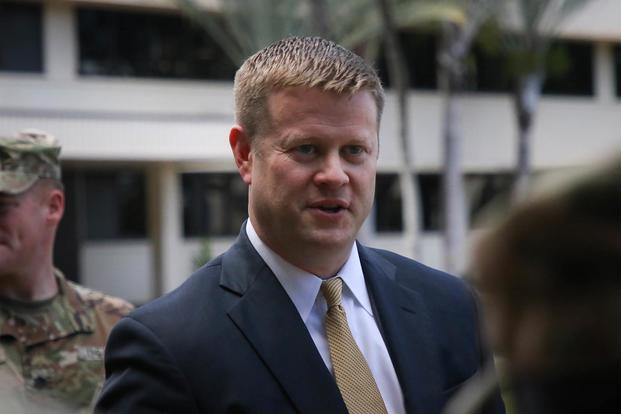On his second day on the job, the U.S. Army's new top official acknowledged that the service is undergoing very abrupt leadership changes. But he pledged that no big changes are on the horizon for the force.
President Trump's dramatic June 18 announcement that Army Secretary Mark Esper would replace Patrick Shanahan as acting secretary of Defense likely stirred uncertainty in an Army already in the midst of transition. The service is preparing to welcome Gen. James McConville as the new chief of staff, Lt. Gen. Joseph Martin as the new vice chief of staff and Sgt. Major Michael Grinston as the new sergeant major of the Army.
As Esper took over as acting Pentagon chief on Monday, Ryan McCarthy, the service's under secretary, assumed his new role as senior official performing the duties of the secretary of the Army.
This is a "big transition for the Army through this summer with the chief, the vice and the sergeant major [of the Army] changing over," McCarthy told reporters at the Pentagon.
"We have circled the wagons and really buckled down ... and put out the word that no policies or priorities are changing," McCarthy said. "We are going to continue, our head down, and continue to march on the same azimuth that we have been on while we work through this transition."
McCarthy also introduced the Army's general counsel, Jim McPherson, who will take over the responsibilities as undersecretary of the Army.
"We asked Mr. McPherson to come in and perform the duties of the under undersecretary of the Army's office; it's very fortunate that he has been the general counsel for the last 18 months," McCarthy said, adding that McPherson previously served as the Navy's judge advocate general.
Trump has announced his intent to nominate Esper and McCarthy to the positions. All three will retain their current titles until they have been nominated and confirmed by Congress.
McPherson said his principal deputy, Robert Sander, is a presidential appointee, which is unique to the Army.
"So, Mr. Bob Sander can perform the duties of the general counsel," McPherson said.
McCarthy said McPherson has been involved with the Army's ambitious modernization effort, aimed at replacing every major combat system in the Army by 2028.
As the incoming chief of staff, McConville was "instrumental in the modernization strategy and all of the restructuring decisions that were made," McCarthy said, adding that he will be a "champion of that going forward."
"The nice thing is, all of the people in this orbit right now have been either close to it or directly hands-on with ... modernization, so the transitions won't be as steep of a challenge as they would if you are coming from a different part of the Army," McCarthy said.
McCarthy is no stranger to the job of Army secretary. He served as the acting secretary from Aug. 1 to Nov. 16, 2017. McCarthy also served in the 75th Ranger Regiment from 1997 to 2002 and deployed to Afghanistan in support of Operation Enduring Freedom.
McCarthy said that the transition may bring some "bumpiness along the way, but we are going to have things smoothed out this summer."
McCarthy said that he has and will continue to send that message to soldiers in the active, National Guard and Reserve components.
"Inside the force, quite frankly, you've got to go down and see your soldiers; you've got to look them in the eye and tell them what you are doing. Soldiers are professionals, they will respond," McCarthy said. "You've got to look them in the eyes, you got to tell them you are in charge and this is how we are going to do things."
-- Matthew Cox can be reached at matthew.cox@military.com.












